On March 11, President Hassan Rouhani arrived in Iraq for a three-day visit. It was his first official visit to Iran’s western neighbor. Iran and Iraq are Shiite-majority countries that share centuries-deep cultural and religious ties — and a 900-mile border. The Islamic Republic has used these advantages to permeate Iraq’s political, security, economic, and religious spheres. Rouhani’s meetings with top political, military, community, and religious leaders clearly signaled that Iran’s relationship with Iraq will remain strong despite U.S. concerns.
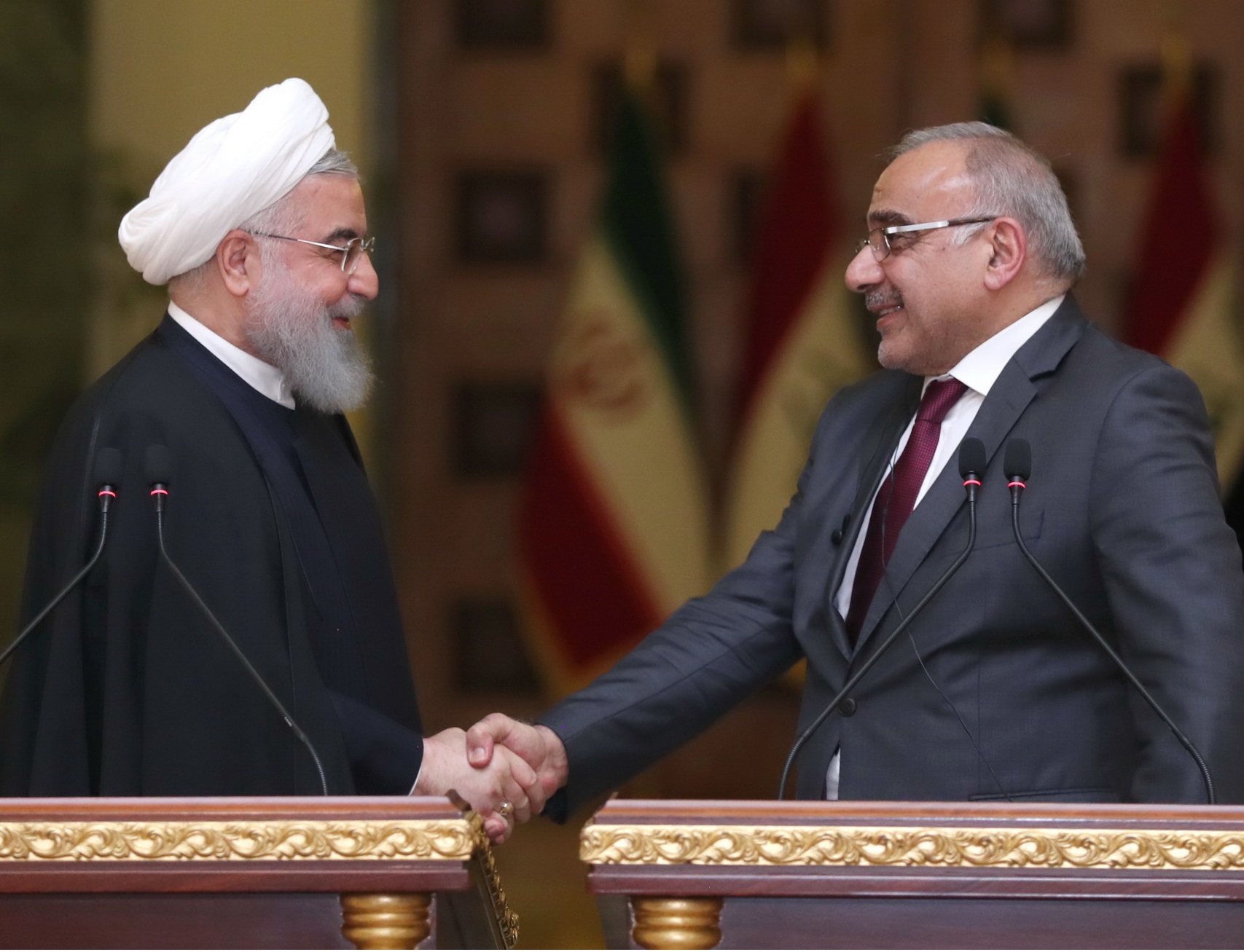
Iran is seeking to expand trade with Iraq to help offset reimposed U.S. sanctions. “Today, our economic cooperation amounts to $12 billion a year, and we can easily increase this to $20 billion in the coming years,” Rouhani said at the airport before leaving Iran. “The message of this visit is that no bureaucracy and third country can affect the amicable, brotherly relations between Iran and Iraq,” Rouhani told his Iraqi counterpart, Barham Salih, in one of his first meetings in Baghdad. Rouhani was referring to the United States, which wants Iraq to buy less goods, electricity and gas from Iran. “At the time when the United States is seeking to pressurize the Iranian nation with its unjust sanctions, we need to develop and deepen our relations to stand against them,” Rouhani told Iraqi political leaders.
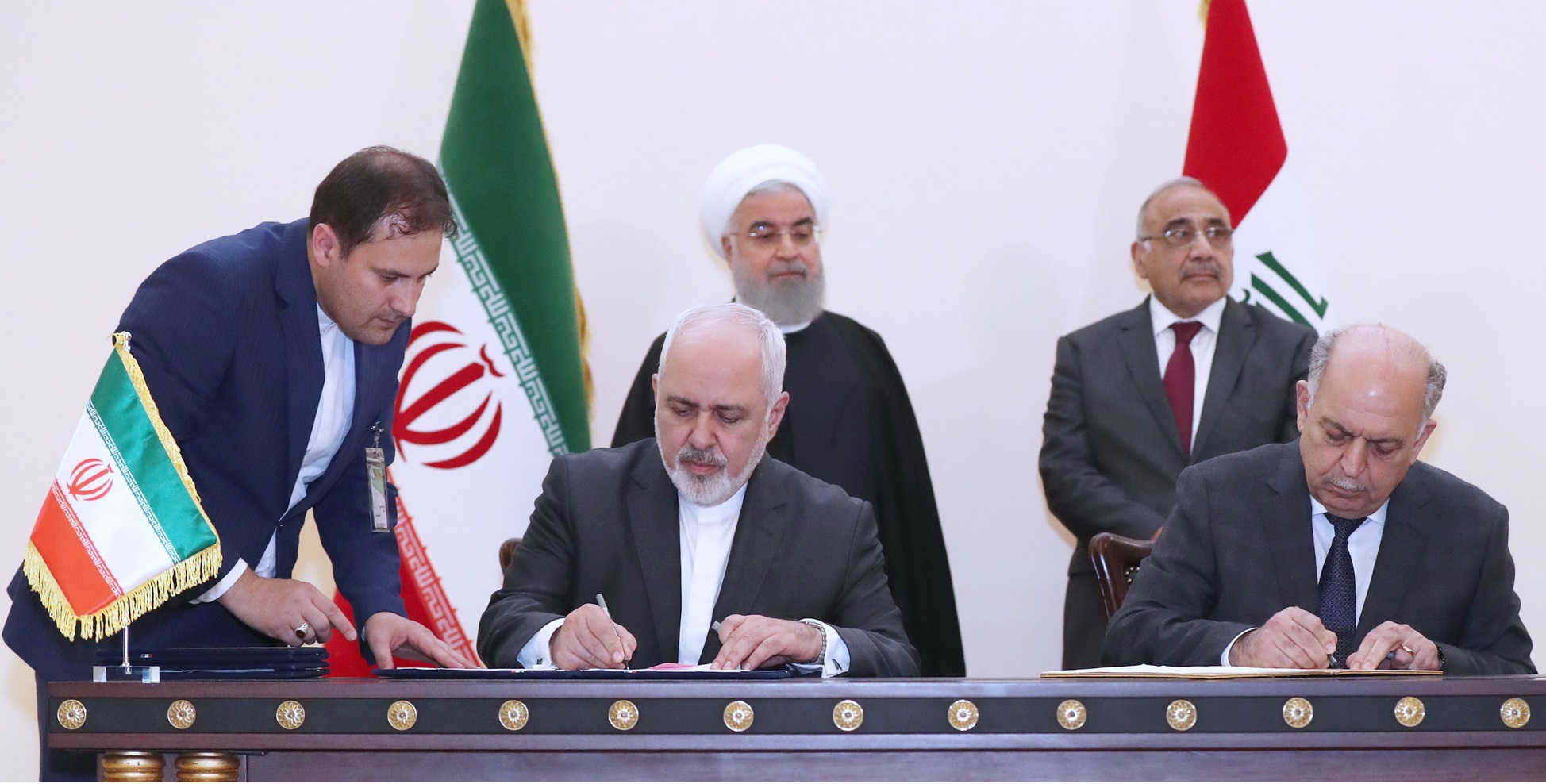 On his first day in Iraq, however, officials signed several preliminary trade pacts on oil, trade, health, and a railway to link the southern city of Basra with the Iranian border town of Shalamcheh. On March 12, Rouhani spoke at an economic trade forum focused on bilateral ties. He noted that the governments had agreed to issue visas for each country’s citizens free of charge. “The Iranian side praised Iraq’s decision that it would not be part of the sanctions against them,” said Iraqi Prime Minister Adel Abdul Mahdi. Rouhani traveled to Karbala to speak with local leaders and visit the shrines of Imam Hussein and Abbas ibn Ali in Karbala.
On his first day in Iraq, however, officials signed several preliminary trade pacts on oil, trade, health, and a railway to link the southern city of Basra with the Iranian border town of Shalamcheh. On March 12, Rouhani spoke at an economic trade forum focused on bilateral ties. He noted that the governments had agreed to issue visas for each country’s citizens free of charge. “The Iranian side praised Iraq’s decision that it would not be part of the sanctions against them,” said Iraqi Prime Minister Adel Abdul Mahdi. Rouhani traveled to Karbala to speak with local leaders and visit the shrines of Imam Hussein and Abbas ibn Ali in Karbala.
U.S. officials simultaneously painted a different picture of Iranian involvement in Iraq. On March 12, Secretary of State Mike Pompeo accused Tehran of using its energy exports to “exert undue influence” across the Middle East, especially in Iraq. “While the United States is working to develop an independent, sovereign Iraq, Iran is using its energy to create a vassal state,” he said. In an interview with Alhurra TV, U.S. Special Representative for Iran Brian Hook went further. “I think what Iran would ultimately like to see happen is Iraq turn into a province of Iran so that they can create a military highway across the northern Middle East that the Iran Revolutionary Guard Corps can use to ferry missiles and weapons,” he said. “The Iranian regime wants to replace a national identity. They want to dissolve it and replace it with a Shi'ite identity. This has been the core of their foreign policy to create sectarian divisions. They want to do that in Iraq, as well,” he claimed.
Several Iranian newspapers highlighted the stark contrast between Rouhani’s three-day multi-city tour and President Donald Trump’s surprise visit to Iraq on December 26. Trump and first lady Melania Trump flew in under cover of darkness to deliver holiday greetings to U.S. troops. The unannounced visit lasted for some three hours. “Rouhani Visits Baghdad in Daylight, Trump in Darkness,” read the front page of hardliner newspaper Kayhan on March 12. The front page of Ebtekar (below), a Reformist-leaning paper, read “Strategic Bonds in Broad Daylight.”
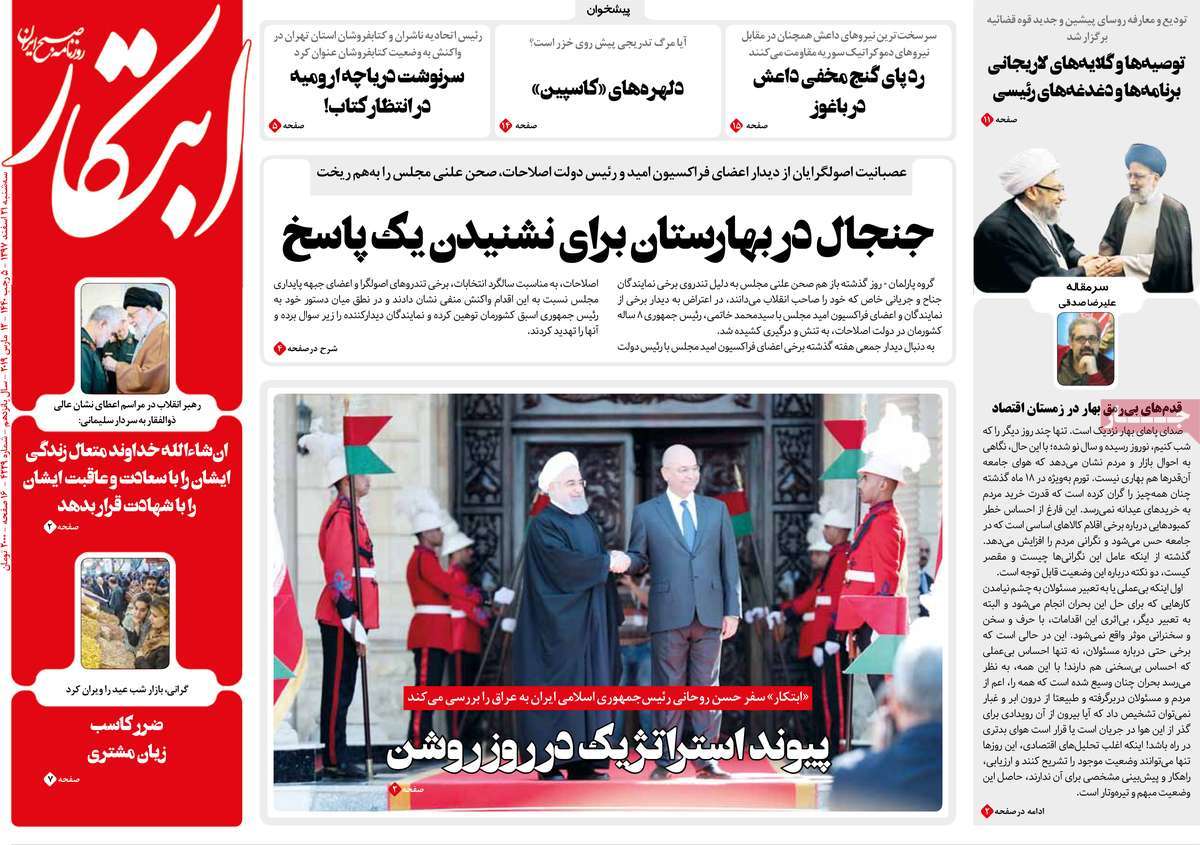
In a meeting with Iraqi elites, Rouhani claimed Western powers, including the United States, were responsible for sponsoring ISIS and moving terrorists across Central Asia. He denied the role of the United States and European countries in the fight against ISIS. “We did not let hegemonic powers introduce themselves as the savior of the region, and today, everyone knows that these Western powers did not have any role in the elimination of terrorists from the region,” he said on March 12.
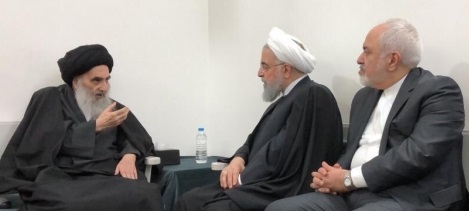
On March 13, Rouhani visited the holy city of Najaf, where he visited top Shiite clerics, including Grand Ayatollah Sayyid Ali al Sistani, Iraq’s most influential Shiite cleric. Sistani, 88, rarely appears in public or meets with officials. Rouhani’s predecessor, Mahmoud Ahmadinejad, visited Iraq in 2008 and 2013, but did not see Sistani. Sistani reportedly has refused to meet Qassem Soleimani, the commander of the elite Qods Force unit responsible for Revolutionary Guards missions beyond Iran’s borders. In a statement, Sistani said that he supports “any steps to strengthen Iraq’s relations with its neighbors . . . based on respect for the sovereignty of the countries and no interference in domestic affairs.” His words were widely interpreted as a reference to Iraqi Shiite militias with strong ties to Iran. They played a key role in liberating territory from ISIS but have since gained significant political clout. Despite the thinly veiled message, Rouhani’s ability to secure a meeting with Sistani, who is Iranian and has a large following in his home country, may boost the president’s domestic standing. The meeting was covered extensively by Iranian media. A headline published by the Iranian Student News Agency read, “The Meeting between the Sheikh of Diplomacy and the Marja’a (highest religious authority) of Moderation.”
Hardliners have criticized Rouhani’s more moderate approach on foreign policy, but the successful Iraq trip may be used by supporters to argue that he is effective. Rouhani received tangible assurances that Iraq will not comply with U.S. sanctions on Iran and was also warmly welcomed by a wide range of Iraqi leaders, including Sunnis. Ahmadinejad’s visits to Iran, in contrast, were marked by Sunni boycotts of meetings with him and harsh statements from politicians warning about Iran’s negative influence in Iraq.
The following are excerpted remarks by Rouhani and Iraqi leaders from the visit.
President Hassan Rouhani
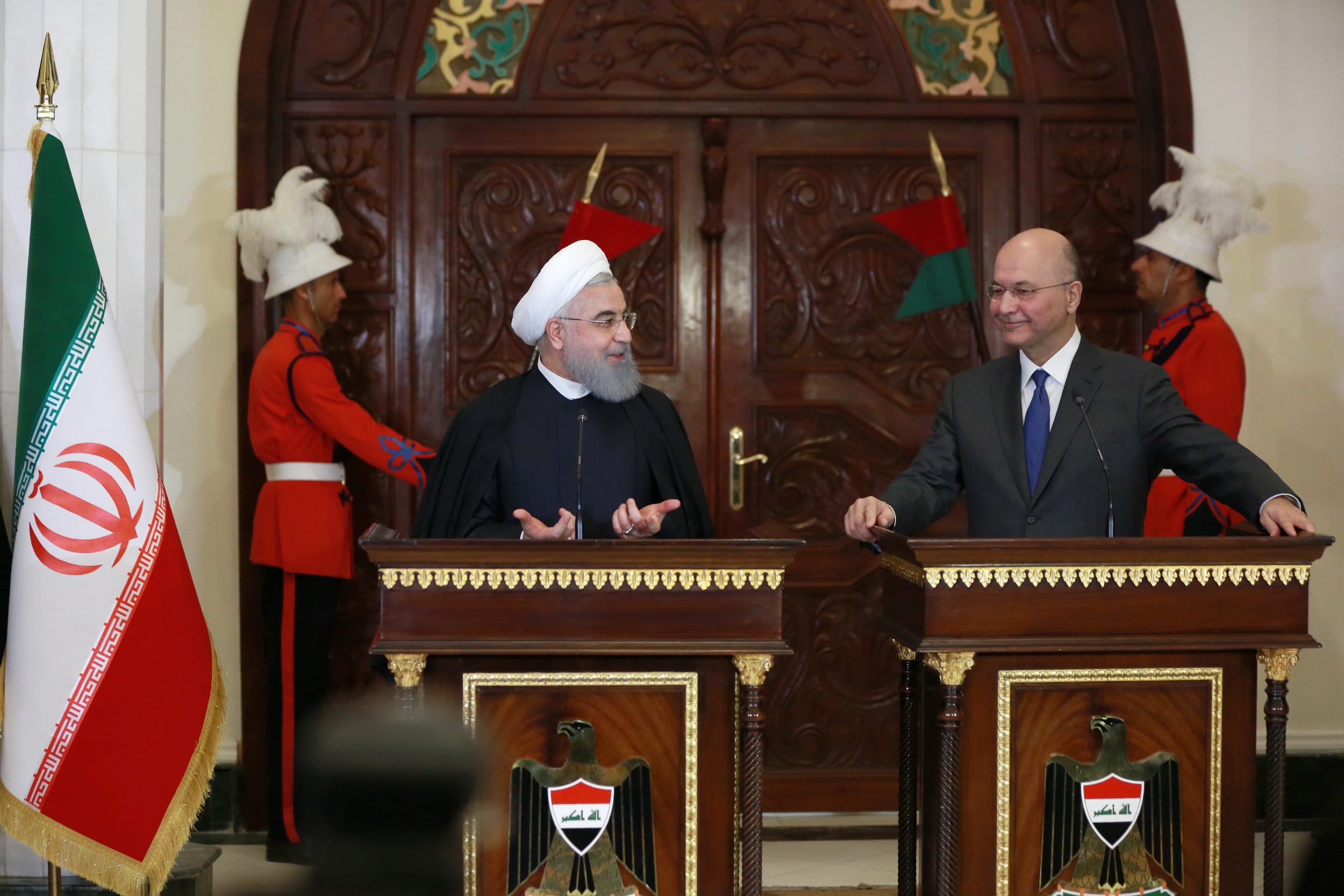 “The Islamic Republic of Iran, in its entirety, is determined to further develop relations with Iraq.”
“The Islamic Republic of Iran, in its entirety, is determined to further develop relations with Iraq.”
“Close Tehran-Baghdad relations is what our nations want. Iranian scientists and religious leaders have always been alongside each other and the Najaf and Qom seminaries have been the cradle of many great religious authorities.”
“Supporting the central banks of the two countries and trade with the use of national currencies will eliminate the need for foreign currencies.”
“Iran and Iraq can develop their cooperation and relations in different fields, such as energy, transportation, transit of goods, taking better advantage of Arvand Rud and linking the railways of the two countries to each other.”
“We are ready to transfer our experiences and technical and engineering services to Iraq.”
“Fighting terrorist must continue until they are fully rooted out and Iran is ready to actively participate in Iraq’s reconstruction.”
“The message of this visit is that no bureaucracy and third country can affect the amicable, brotherly relations between Iran and Iraq.”
—March 11, 2019, during a meeting with his Iraqi counterpart
In the name of Allah the Merciful, we thank the Republic of Iraq as Government and people for the hospitality extended to the Iranian delegation during their three-day visit.
We feel that Iraq is in our second homeland and the relations between the two countries and the two peoples in fact are not new. These relations go back thousands of years, as these ties are religious, cultural, historical and regional relations, not the relations we dispense with, but we must make every effort to strengthen and develop them.
The talks that took place between me and His Excellency the President in fact were good and kind. In all the talks between us, I did not find any point of disagreement between us. The relations between Iran and Iraq are in fact for the benefit of the Iranian people and for the benefit of the Iraqi people. These relations are of common interest.
No doubt, we are doing our utmost to strengthen and secure these relations and not leave them in all fields.
We believe that there are broad areas for joint cooperation between the two countries. These fields are the fields of trade cooperation as well as investments and the establishment of joint industrial cities, border markets and bilateral tourism relations between the two countries as well as the movement of religious visitors we see and witness between us in addition to cooperation in the fields of energy, gas, electricity, petroleum, banking, technical, engineering and technical services, as well as cooperation in the fields of roads, railways and waterways such as the River Wind as well as issues related to the environment and issues and political, regional and international issues.
We in the two countries in fact over the past years have faced many difficulties and many problems as a result of the terrorism that was present and the Iraqi people and the Iranian people in fact had suffered from this evil phenomenon and we were by the side of the Iraqi people and we were by the side of the Iraqi army during the difficult days that were in this country. We are pleased by our standing by your side.
We regard Iraq as an important country in the region. We consider Iraq an Islamic state and an Arab state. This country can actually play a greater role in providing security and in establishing closer relations with the countries of this region.
We want to be with Iraq to be by the side of Iraq and to be united with Iraq, not against others, of course, but we want to provide the ground to receive others and be with us.
What we are concerned about is the stability of Iraq, the security of Iraq and the democracy we see in Iraq. We know that a secure Iraq, an independent Iraq will in fact have a major role in providing security and stability in this region.
Finally, I would like to say something, and I would like to say again in other places. I would like to extend my sincere thanks and gratitude to the Iraqi people, especially the generous hospitality that they held and are holding for the Iranian visitors, especially in the days of Arbaeenia of Imam Hussein, peace be upon him.
We attach great importance to this visit. By the way, we would like to thank His Excellency the President. We hope that these relations will develop, God willing, day by day in various fields and that relations between us and the Iraqi people will grow. Thank you.
—March 11, 2019, during a joint press conference with his Iraqi counterpart
“In our negotiations with the Prime Minister of Iraq, we agreed to further develop relations between the two peoples, and in doing so, Iran announces that it will not receive any fees for visas, and the Iraqi side will announce that it will not receive any fees.”
“The Iraqi side currently prefers the visa regime, but there is no payment for a visa, which is a step forward in the process of facilitating the relations between the two nations.”
“We agreed that on issues related to preferential tariffs, the two sides continued their negotiations.”
“The third thing that was discussed was standard, and we could agree that the exchange of goods in the field of goods, agriculture and medicine be done more easily.”
“Due to the connection of the Iranian railway network with Pakistan, Afghanistan, Turkmenistan, Kazakhstan, Azerbaijan and Turkey, we hope that in the future we will be able to connect the railway between the two countries.”
“On environmental issues, our existing agreements should be implemented more quickly so that we can discuss the issue of dust between the two countries and with other countries of the region.”
“Iran supplies electricity and gas to Iraq, and we have announced that we are ready to export more electricity to the country.”
“Regarding banking, which is one of the key topics of discussion between the two countries, we emphasized quicker implementation of the agreements between the two central banks.”
“We agreed on the necessary maritime relations and facilities, and we hope that Abadan, Khorramshahr and Basra will have a better use of the border river.”
“We are also interested in developing security relations between the two countries. We have always helped each other in recent years. Iran is proud to have helped the countries of the region, including Iraq, from the first day that the ISIS began their terrorist acts.”
“We hope that the close relations between the Iranian government and people with the people and government of Iraq will enable us to have more security and stability in the region.”
“We have taken good steps in the field of technical and engineering services, and we hope that with the banking and financial measures, this cooperation can continue.”
—March 11, 2019, during a press conference with Iraqi Prime Minister Adel Abdul Mahdi
“In combatting ISIS, the Islamic Republic of Iran stood by the people of Iraq.”
“Sowing discord among the countries and people of the region, creating rifts among the ethnic and religious groups, justifying their illegitimate presence in the region, destroying Iraq and Syria and other countries in the region and finally, introducing themselves as the savior and portraying a violent face for Islam were among the goals of the hegemonic powers.”
“The Muslims of the region could tell the world that these terrorists are not real Muslims and, despite anti-Islamic propaganda, Islam is the religion of justice, mercy and peaceful coexistence with all ethnic and religious groups.”
“It was crystal clear where the terrorists were being sponsored, and how and where they were selling oil and plundering relics.”
“We did not let hegemonic powers to introduce themselves as the savior of the region, and today, everyone knows that these Western powers did not have any role in the elimination of terrorists from the region.”
“Nobody in the world doubts that the people of Iraq were the ultimate victor of this war, and the terrorists had nothing to do with Islam, the Prophet, and his progeny.”
“Of course, terrorism has not finished yet, and it is possible that they make different problems for the peoples of the region, because the Americans are transferring them to Afghanistan, the Central Asia and Caucasus.”
“We need a great unity and coalition for creating a major power in the region so that when the superpowers think about this region, the first things that comes to their mind is the unity and civilization of this region, rather than oil and plundering.”
“Millions of Iranians and Iraqis coming and going means that they have historical and cultural interest in each other.”
“We want to build a great power in the region through unity, not against another country, but rather attract other friendly countries in the region, increasing it to three, four and five powers alongside each other.”
“In this visit, we decided to develop our economic, cultural, scientific and political relations day by day.”
“Unity among the Iraqi nation is very important and we know that if ethnic and religious groups are not united in a society, they cannot show their true power in dealing with enemies.”
—March 12, 2019, in an address to Iraqi elites
“The Popular Mobilization Forces have had, and will have, a very important role in consolidating stability, culture and solidarity in Iraq.”
—March 12, 2019, in a meeting with Iraq’s National Security Advisor Faleh al Fayadh
Iraqi President Barham Salih
“We consider the Iranian nation our own family and Iran our second country.”
Establishing strong ties with Iran and developing them “will be for the benefit of Iraq and the region.”
“Iraq will not forget the support of Iran in the days of confronting the tyranny and its great role in combating terrorism.”
“We do not want our country to be an arena of conflict between the competing powers, nor to be a launching pad for attacks on our neighbors.”
—March 11, 2019, during a meeting with President Rouhani
It is my pleasure to welcome the President of the Islamic Republic of Iran, Sheikh Hassan Rouhani, at the Assalam Palace in Baghdad. This visit comes to emphasize the importance of relations between our two countries and two our peoples. These relations are well established in history. They are socio-cultural relations and common security, political and economic interests. These relations are on the benefit the two countries and the benefit both peoples but they are also on the benefit the region as a whole.
We spoke with the President about the importance of proper building for the strengthening of these relations by emphasizing economic ties, enhancing trade between the two countries, and also establishing the an interdependent economic infrastructure of our two countries and peoples that also extends to the entire region from railway linking, and joint industrial zones as well as lifting the obstacles and impediments to religious tourist between the two peoples.
It is a fact that we conclude discussions on small vocabulary and go into the widest space in this relation. This is what is required for our two peoples and this is what is needed for the region as a whole.
It was also an important opportunity for me to assure His Excellency the President, the dear guest, of Iraq's thanks to our brothers in the Islamic Republic of Iran, notably for their role in the fight against terrorism, and in the victory achieved in Iraq against ISIS, which is a victory of an important and significant, but it is incomplete. The eradication of deviant ideology and the eradication of extremism require further sustained regional effort and cooperation.
This context emphasizes that our common security between us and Iran, between us and the countries of the region, require further cooperation in order to counter the reemergence of terrorism again in our country and in our region and this requires that the countries of the region cooperate in this matter and see that Baghdad is the meeting place for the countries of the region in order to reach an understanding and cooperate with each other for common interests, first and foremost to address the deviant thought, this terrorist ideology, and these terrorist organizations, but also to create a system of common economic interests among the peoples of this region, where these conflicts and rivalries that have affected the region finish out.
Iraq is living an important historical turning historical moments; our country has suffered a lot as a result of regional and international conflicts that took place in the Iraqi arena. I am optimistic that the countries of the region understand the importance of stability in Iraq and the importance of supporting the process of stability in it, and that Iraq to be an arena for the convergence of interests amongst the peoples and countries of the region.
I have told the President that there are those who say that the geographical location of Iraq is difficult and has many challenges and problems but on the other hand lucky by its Islamic neighborhood, with our neighbors in Iran, and Iraq is lucky by our neighbors in Turkey and lucky in its Arab extension. This depth of the Arab may and perhaps make Iraq as a factor of reunification of the region based on respect of interests of the peoples of the region and the emphasis on commonality between us of concepts and mutual values . It is time for this region to start what is required of the reconstruction and economic prosperity.
The visit of His Excellency President Rouhani is an important one to us as we are having him as a dear guest.
We wish him a pleasant stay. We hope that his meetings with the Prime Minister and the Government will conclude to important agreements and understandings that strengthen these bilateral relations between our two countries and peoples.
There are contexts that have been agreed upon and will be announced today, all of which are in the interest of serving the two peoples and the two countries and also serve regional stability, and this is what we expect from this visit for the two peoples and the region.
Welcome again President Rouhani Welcome.
—March 11, 2019, during a joint press conference with President Rouhani
Iraqi Prime Minister Adel Abdul Mahdi
“We have always had common interests and today, we feel that relations between Iran and Iraq are becoming stronger day by day.”
“We are determined to deepen ties with Iran in all fields of mutual interest. We should turn the region into the stage of cooperation and friendship among friendly, neighboring countries.”
—March 11, 2019, during a joint press conference with President Rouhani
Joint Iran-Iraq Statement
“Iraq stated that the Islamic Republic of Iran was the first country that helped Iraq for fighting terrorism with its logistic and consulting assistance and stood by the country in the fight against terrorism, and appreciated the Islamic Republic of Iran's stance in helping Iraq.”
“The two sides held important dialogues in a brotherly, friendly and constructive atmosphere and expressed their willingness to develop political, security, economic, health, trade, cultural, scientific and technological fields.”
“The two sides also discussed a number of regional issues, common challenges, fighting terrorism, cooperation for strengthening security and stability in the region and establishing economic cooperation that are to the benefit of regional interests and welfare of the peoples of the region.”
“The two sides also stressed their firm resolve to combat terrorism and organised transnational crimes that pose threats to security and peace of the region.”
“The two sides also discussed issues of interest and signed memoranda of understanding in oil, trade, health, rail transportation between Shalamcheh and Basra, as well as issuing visas for tradespeople and investors of the two countries.”
“The two sides agreed that tourism, pilgrimage and commerce visas will be free of charge for the citizens of both countries starting from April 1, 2019.”
—March 12, 2019, in a statement
Photo Credits: President.ir
